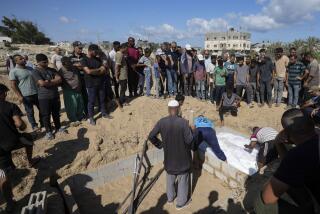At Least 12 Killed in Attack on Shiite Cemetery in Najaf
- Share via
NAJAF, Iraq — A car bomb exploded Thursday near the gates of the sacred Shiite Muslim cemetery here, killing at least 12 civilians and injuring dozens in the latest provocative assault on the country’s Shiite majority.
The casualties included women and children who were visiting the graves of relatives at the sprawling cemetery, the most revered in the Shiite faith because it lies next to the shrine of Imam Ali, son-in-law of the prophet Muhammad and the sect’s most venerated figure.
A medical assistant said he saw medical workers bring the charred bodies of three women into the hospital’s morgue, where family members collected the remains and wept.
“Why? Why?” cried Mohammed Hussein Kadhim, whose 14-year-old nephew Karrar bled to death from shrapnel that lodged in his skull. “What had he seen of life?”
The bombing came amid heightened political tensions over stalled talks to form a new Iraqi government. Sunni Arab, Kurdish and Shiite factions have blocked attempts by interim Prime Minister Ibrahim Jafari to retain his post for a four-year term. U.S. and Iraqi officials as well as ordinary citizens have decried the months-long parliamentary stalemate.
Jafari, who has resisted calls to step aside, said Thursday at a news conference that he would do so if parliament formally rejected his ministerial nominations. But a news conference scheduled to announce the next parliamentary session was canceled as Iraq began a four-day holiday.
The lingering impasse and daily eruptions of sectarian violence have also dogged President Bush, who is under increasing pressure to draw down troops in Iraq. Speaking to college students in Charlotte, N.C., Bush said that newly elected lawmakers in Baghdad must “get moving” to live up to the Iraqi public’s expectations of democracy.
“Part of the process now is to say to the Iraqi leaders: ‘People said something. Now you need to act,’ ” Bush said. “The people want there to be a democracy, and it requires leadership, for people to stand up and take the lead.”
Scott McClellan, the White House press secretary, said the president felt it was particularly important to get a new Iraqi government in place because of the recent spate of sectarian violence, triggered by the Feb. 22 bombing of a Shiite shrine in the central Iraqi town of Samarra.
“There is a political vacuum that needs to be filled,” McClellan said. “It’s important to move forward on a unity government quickly to really disable those who are seeking to create that sectarian violence.”
Sunni insurgents and Shiite militias have exploited the political and security vacuum.
Police in Najaf said the attacker in a car packed with explosives managed to evade checkpoints to enter the crumbling Old City surrounding the shrine and gain access to a section used for funeral processions.
Witnesses said the area became engulfed in fire, smoke and blood. Police thronged the area after the incident and announced a vehicle ban until further notice.
The 1:15 p.m. explosion was the latest in a series of attacks on key Shiite religious sites by insurgents seemingly determined to spark a full-scale civil war. The destruction of the shrine in Samarra sparked a torrent of killings by Shiite militiamen targeting Sunni Arabs.
The Najaf cemetery is considered by Shiites worldwide as the most important place for burial. For centuries, Shiites from Lebanon to India have sought to be interred there. The complex was badly damaged during clashes between U.S.-led forces and Shiite militiamen in the summer of 2004.
Iraq’s Shiites and embittered Sunni Arab minority have been engaged in an often bloody power struggle since the fall of Saddam Hussein’s Sunni-dominated government. Sectarian violence has resulted in thousands of deaths, and many of the Shiite victims have been brought to Najaf for burial.
Sunnis increasingly have been targeted, as well. On Thursday, police in western Baghdad found six bodies, handcuffed and with bullet wounds to the head, executions seen as bearing the signature of the Shiite militias with alleged ties to the Interior Ministry.
In Basra on Thursday, the Sunni Waqf endowment announced the closure of all Sunni mosques for a 48-hour period beginning Tuesday. The move is in protest against near-daily killings of prominent members of the Sunni community in the southern port city.
West of Baghdad, at least seven members of the Iraqi security forces were injured in roadside bombings; U.S. convoys in Ramadi and Haditha also were targeted. There were no immediate reports of casualties.
A police patrol was hit in a roadside explosion in downtown Baqubah, a volatile, mixed Shiite-Sunni town northeast of Baghdad. Six civilians and two policemen were injured.
The U.S. military said Thursday that officials had used DNA testing to confirm the identity of an alleged insurgent leader arrested a month ago. Muhammed Hila Hammad Ubaydi, an intelligence officer in Hussein’s government, led an insurgent group with ties to the Al Qaeda terrorist network, the military said in a news release.
Ubaydi’s group allegedly took part in the kidnapping of Italian journalist Giuliana Sgrena, assassination attempts against Iraqi officials and roadside bombings, the statement said.
Times staff writer Daragahi reported from Baghdad and special correspondent Fakhrildeen from Najaf. Staff writer Peter Spiegel in Charlotte and special correspondents in Baqubah and Ramadi contributed to this report.
More to Read
Sign up for Essential California
The most important California stories and recommendations in your inbox every morning.
You may occasionally receive promotional content from the Los Angeles Times.












